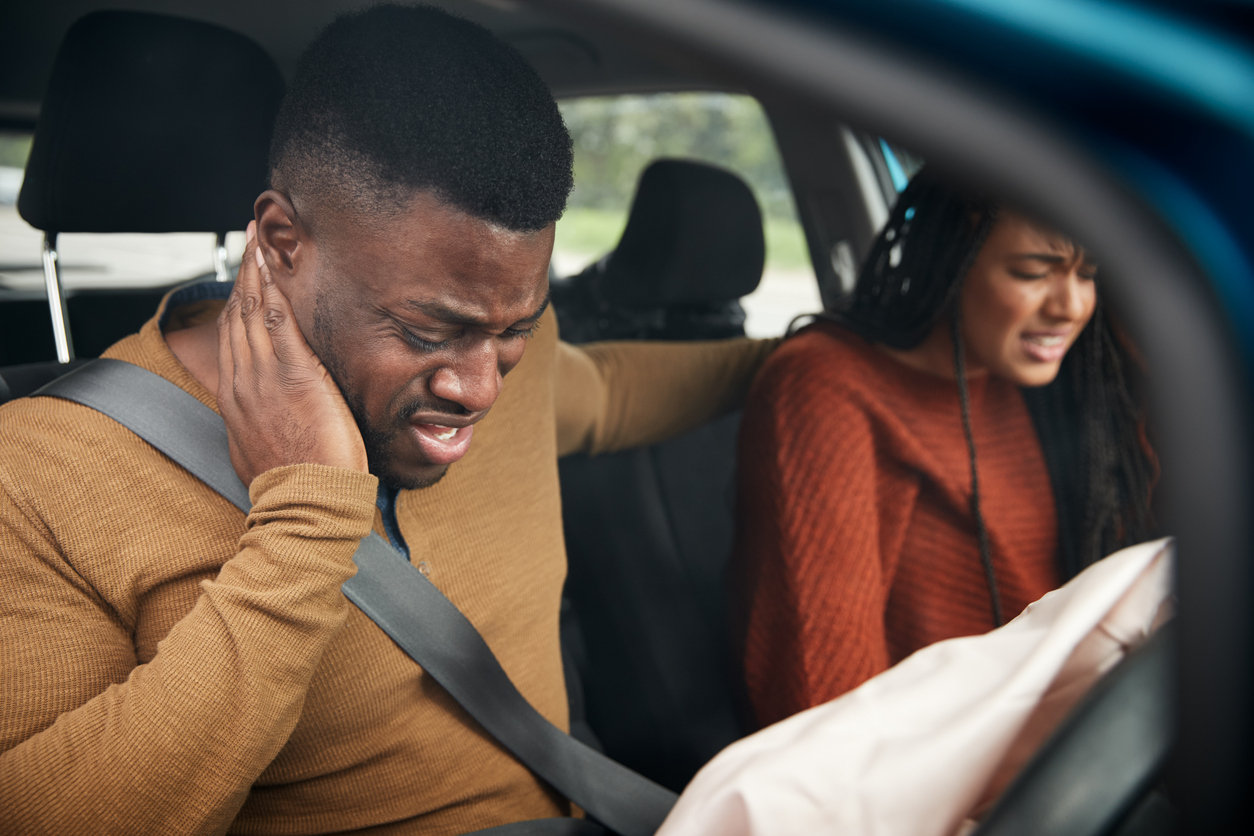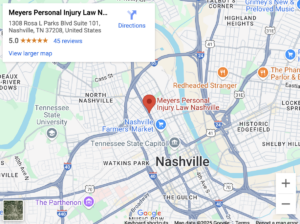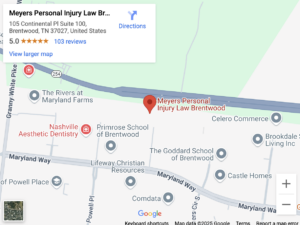Chad Meyers | July 31, 2024 | Car Accidents

Car accidents are stressful under any circumstances, but when you’re driving a leased vehicle, the situation can become even more complicated. If you get into an accident while your car is on lease, your first steps should be to ensure your safety and contact emergency services if necessary. It’s crucial to gather all necessary information, including insurance details and accident reports, as this will be vital for the next steps. A Nashville car accident attorney can help guide you through the legal and insurance complexities specific to leased vehicles, ensuring your rights are protected and your obligations are clearly understood.
After addressing immediate concerns, you need to inform both your insurance company and the leasing company about the accident. Depending on the severity of the damage and your insurance coverage, you may either proceed with repairs or face the possibility of the car being declared a total loss. In either case, understanding your lease agreement and the responsibilities outlined within it will be crucial in navigating the aftermath efficiently.
Moreover, if the car is totaled, insurance will typically cover the actual cash value of the vehicle, not necessarily the remaining amount owed on the lease. This can lead to additional costs that you need to address promptly.
Immediate Steps to Take Following a Leased Vehicle Accident
In an accident involving a leased car, it’s crucial to ensure safety, gather necessary information, and document the situation accurately. These steps can help streamline the claims process and avoid potential complications with the leasing company.
Ensure Safety and Call Emergency Services
The first priority is the safety of everyone involved. Check for injuries and call 911 if medical attention is needed. If the accident is minor and there are no serious injuries, move the vehicles out of traffic if it’s safe to do so.
Always contact the police, especially if there are significant damages or injuries, as a police report is essential for insurance claims. Keep calm and follow any instructions given by emergency responders.
Exchange Information with the Other Driver(s)
After ensuring safety, exchange information with the other driver(s). This includes names, addresses, phone numbers, and insurance details. Write down the make, model, and license plate number of the other vehicles involved.
It’s also wise to get the names and contact information of any witnesses. Clear communication and accurate information exchange can help facilitate the claims process and avoid disputes later on.
Document the Scene and Gather Evidence
Documenting the scene of the accident thoroughly is critical. Take clear, detailed photos of all vehicles involved, including close-ups of damage and wider shots showing the entire scene. Photograph any skid marks, road signs, or traffic signals that might be relevant.
Write down the time, date, and location of the accident, along with your own account of what happened. Collecting this evidence can be invaluable when working with insurance companies and the leasing company to determine liability and cover repair costs.
Understanding Your Lease Agreement and Insurance
Being in a car accident with a leased vehicle adds layers of complexity, especially regarding your lease agreement and insurance coverage. Key aspects include legal responsibilities and the specifics of filing claims with your insurance.
Legal Considerations for Leased Vehicles
Legal obligations tied to leased vehicles differ from those for owned vehicles. A lessee must adhere to the terms outlined in the lease agreement, which include maintaining comprehensive insurance coverage. This ensures protection against physical damage to the car.
If the vehicle is totaled, lessees are still responsible for the remaining lease balance. In many cases, the leasing company will require that the insurance company pays the vehicle’s actual cash value (ACV). Familiarizing yourself with these terms can help manage obligations effectively.
Insurance Implications
Insurance implications can be significant when leasing a vehicle. Filing a claim follows a process where the insurance company assesses the damage and either authorizes repairs or declares the car a total loss.
Leased and owned vehicle insurance differ in several ways. Leased car agreements usually mandate higher coverage limits, and gap insurance is often recommended to cover any shortfall between the insurance payout and the amount owed on the lease.
Additionally, the leasing company may have its own insurance policies as part of the lease terms, which can play a role when an accident occurs. Understanding these requirements ensures you’re adequately prepared.
Responsibilities After a Leased Car Accident
After a leased car accident, immediate actions include notifying the leasing company and addressing repairs and maintenance. These steps are crucial for handling potential consequences and liabilities.
Notify the Leasing Company
Immediately after an accident, the car lessee must inform the leasing company. This notification is important because the car is still the property of the leasing company.
Failure to notify them can result in penalties. The leasing company will provide guidance on your specific responsibilities and may involve their insurance in the claims process. Detailed documentation of the accident, including police reports and photographs, can facilitate smoother communication and processing. Adhering to their instructions can prevent further complications.
Repairs and Maintenance Responsibilities
Addressing repairs and maintenance promptly is essential. The lessee is responsible for ensuring the vehicle is restored to its original condition, based on lease agreements.
Insurance might cover repair costs, but ensure the repairs are done at approved facilities to avoid penalties. Keeping records of all repairs and maintenance actions can be beneficial. Compliance with the manufacturer’s maintenance recommendations also affects lease end penalties. Minor damages, if left unaddressed, could lead to substantial charges later.
Understanding these responsibilities thoroughly can mitigate liabilities and ensure smoother lease term management.
Consulting with Legal Professionals
When involved in an accident with a leased car, seeking legal advice is crucial. Understanding your responsibilities and rights can save you from potential pitfalls. Meyers Personal Injury Law in Nashville is a reputable option for those needing legal assistance.
Our legal professionals can help navigate leased vehicle accident insurance complexities. They can explain your obligations under both your car lease and insurance policy.
A skilled lawyer from our law firm will provide clarity on whether you or the leasing company should handle repair costs. They might also address issues related to liability and potential lawsuits if you’re found at fault.
Our Tennessee personal injury lawyers can also determine the value of any injury claims arising from the accident. Whether minor or significant, injury claims can complicate an already stressful situation. Consulting a lawyer ensures that you receive fair compensation.
To facilitate the legal process, gather essential documents such as accident reports, insurance policies, and lease agreements. Providing these to your lawyer helps streamline your case.
In case your insurance company denies coverage or disputes your claim, legal professionals will advocate on your behalf. They will manage communication and negotiations, relieving you of added stress.
Seeking legal help for an accident in a leased car is not just advisable; it can significantly impact the outcome of your case. Legal experts provide guidance, manage paperwork, and handle complicated legal jargon, making the process less daunting.
Legally navigating a leased car accident in Nashville can be tricky, so don’t hesitate to seek professional advice. We’re here to help in any way we can.
Contact Our Nashville Personal Injury Law Firm Today at Meyers Personal Injury Law
If you were injured in an accident in Nashville or Brentwood and need legal help, contact our Nashville personal injury lawyers at Meyers Personal Injury Law to schedule a free case review today.
Meyers Personal Injury Law Nashville
1308 Rosa L Parks Blvd Suite 101,
Nashville, TN 37208
(615) 258-9000

Meyers Personal Injury Law Brentwood
105 Continental Pl Suite 100,
Brentwood, TN 37027
(615) 258-9000
About the Author Chad Meyers

Chadwick D.G. Meyers is the founding attorney of Meyers Personal Injury Law. He earned his J.D. from the Nashville School of Law and focuses his practice on serious personal injury cases involving car accidents, wrongful death, funeral home negligence, and more.
Chad is frequently consulted by attorneys nationwide on complex claims and has been recognized by The National Trial Lawyers and other legal organizations. Click here to view some of the successful case results Chad has achieved for his clients.



